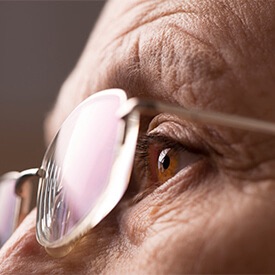Age-Related Macular Degeneration in Napa, CA
What Is Macular Degeneration?
Macular degeneration, typically age-related macular degeneration, is a common eye condition that can develop with age. The condition causes the macula (the center of the retina) to deteriorate. The macula is a vital component for vision as it allows for central vision, impacting many aspects of normal eye function and the ability to see right in front of you. At Eye Specialists of Napa Valley, we aim to recognize and treat this disease to the best of our ability, as it is a primary cause of vision loss among Americans over the age of 50. When we detect and treat macular degeneration as early as possible, we are better able to preserve your central vision.
There are two types of macular degeneration, the dry form and the more advanced wet form. For dry macular degeneration, managing the condition to reduce the risk of progression to wet AMD is vital. If you have been diagnosed with wet AMD, your doctor will likely recommend injections to delay its progression or even improve your vision. When you need treatment for macular degeneration in Napa, CA, our board-certified eye surgeons can help you create a treatment plan for both wet and dry macular degeneration.
What Are the Symptoms of Macular Degeneration?
The macula aids in sending images from the optic nerve to the brain. When the macula is damaged, the brain struggles to understand the images the eyes are seeing. Patients suffering from macular degeneration typically do not exhibit symptoms until the disease processes. Some of the symptoms that may manifest as the disease worsens include:
- Visual distortions
- Difficulty adjusting to low light
- Colors may seem less bright or intense
- Generally hazy vision
- Blind spots in your field of vision
What Causes Macular Degeneration?
Though macular degeneration can be an inherited eye disease, it can also develop in individuals without a family history of the disease. Macular degeneration occurs when the macula, located at the back of the eye, starts to degenerate. Aging is the primary factor in developing age-related macular degeneration. An individual’s risk of developing non-age-related macular degeneration can depend on certain factors, such as:
- Diabetes
- Head Injuries
- Infections
- Diets without the sufficient amount of nutrients
What Are the Risk Factors for Macular Degeneration?
Understanding the risk factors for macular degeneration is crucial for proactive eye health management. While the exact cause of this condition remains unclear, several factors can increase the likelihood of developing it. Those include:
- Age: Individuals over 50 are at higher risk.
- Genetics: A family history of macular degeneration increases susceptibility.
- Smoking: Tobacco use significantly elevates the risk of developing the condition.
- Obesity: Being overweight or obese can contribute to the likelihood of macular degeneration.
- High blood pressure: Hypertension is associated with an increased risk of the condition.
- Prolonged exposure to sunlight: UV radiation exposure may contribute to the development or progression of macular degeneration.
How Is Macular Degeneration Diagnosed?
Macular degeneration is typically diagnosed through routine eye exams, including tests like fundus photography and optical coherence tomography. While genetics and aging contribute to the development of this eye condition, the team at Eye Specialists of Napa Valley creates personalized treatment plans upon diagnosis. Early detection and management are crucial for preserving eye health and eyesight. If you think you may be at risk of macular degeneration or are experiencing symptoms of this condition, schedule your appointment to be evaluated for macular degeneration today.
How Is Macular Degeneration Treated?
Macular degeneration is typically discovered during a routine eye exam, and our team will perform a variety of tests to diagnose the condition and determine next steps. Tests can include fundus photography, fluorescein angiography, and optical coherence tomography (OCT). Following a diagnosis of macular degeneration, we will create a macular degeneration treatment plan for you depending on the type of AMD and severity.
At Eye Specialists of Napa Valley, a common macular degeneration treatment we administer for wet macular degeneration are injections into the eye. Prior to the eye injection, you will be numbed for your comfort. Once confirmed that you are numb and the area has been cleaned, your ophthalmologist will ask you to look in a specific direction, and you will likely only feel a little pressure once the injection is given. While the injection takes just a second or two, the procedure itself takes about 20 minutes.
After your procedure, you will be able to return home. It is normal to experience some blurry vision, irritation in your eye, and redness following your injection. This typically does not last long and is perfectly normal, but if you have any concerns, our team will be happy to speak with you. For two days following your injection, you should avoid rubbing your eye.
What You Can Expect After Treatment for Macular Degeneration
After treatment for macular degeneration, you may notice improvements in vision stability or even slight enhancements, depending on the type and stage of your condition. It is normal to experience temporary blurry vision, mild irritation, or redness following certain treatments, such as eye injections. These symptoms typically resolve within a day or two. Your doctor will provide specific post-treatment guidelines, such as avoiding eye rubbing for a couple of days. Regular follow-up appointments will be necessary to monitor your progress and adjust your treatment plan as needed, ensuring the best possible outcome for maintaining your vision.
Is Treatment for Macular Degeneration Covered by Insurance?
In most cases, treatment for macular degeneration is at least partially covered by insurance, but the level of coverage can vary depending on your plan and the type of treatment you receive. Our team at Eye Specialists of Napa Valley can review your insurance details and help clarify what’s included under your benefits. We assist with verifying coverage, submitting documentation, and explaining any potential out-of-pocket costs before your treatment begins. Whether your care involves diagnostic testing, ongoing monitoring, or specialized therapies, our team is here to make the process as smooth and transparent as possible.
Macular Degeneration FAQ
Is age-related macular degeneration hereditary?
Heredity and genetics can play a role in age-related macular degeneration. Your chances of getting macular degeneration are higher if you have a family history, although it doesn’t mean that you will develop it. Talk to our eye doctors for more information on macular degeneration and the treatments offered.
Does reading make macular degeneration worse?
The act of reading does not make age-related macular degeneration worse. You might find that you tire easily while reading, meaning that you might require more breaks than before. Talk to our eye doctors for more information on macular degeneration treatment and how we can help.
Can macular degeneration cause blindness?
More severe cases of macular degeneration can cause blindness, but not in your peripheral vision. This means that you won’t go completely blind, but depending on the severity of the macular degeneration, you can become “legally blind.”
Can age-related macular degeneration only affect one eye?
Age-related macular degeneration can develop in only one eye. However, as the disease progresses, it is likely that both eyes will become affected.
Can macular degeneration progress without noticeable symptoms?
Yes, macular degeneration can progress in its early stages without noticeable symptoms. Many patients with dry macular degeneration may not realize they have the condition until it has advanced and starts to affect their vision. Regular eye exams are crucial for early detection and management, even if you are not experiencing any vision problems.
Is there a connection between smoking and macular degeneration?
Yes, smoking is a significant risk factor for macular degeneration. It can damage the blood vessels in the eyes, reduce blood flow to the retina, and increase oxidative stress, all of which contribute to the progression of the condition. Quitting smoking can help lower the risk and support overall eye health. If you are concerned about how smoking may impact your vision, speak with your ophthalmologist for guidance.
Manage Your Macular Degeneration, Preserve Your Eyesight
Detecting age-related macular degeneration early on is an important aspect of preserving your eye health and eyesight. In the event you develop wet or dry macular degeneration, our team at Eye Specialists of Napa Valley can recommend treatments such as oral vitamins or even eye injections, should they be necessary. For more information on macular degeneration Napa, CA treatments or to schedule a consultation with one of our board-certified ophthalmologists, contact our Napa, CA office today.
Related Posts
How Important is UV Protection for Your Eyes?
*Individual results are not guaranteed and may vary from person to person. Images may contain models.




